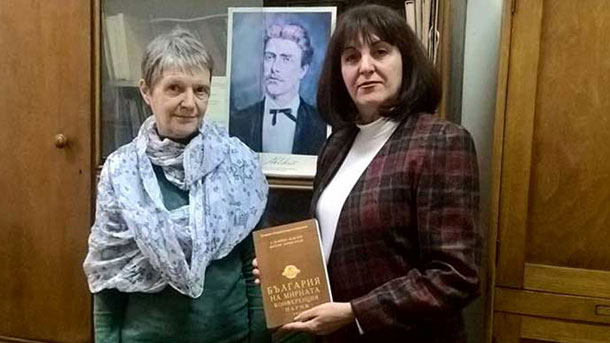On February 10, 1947 in Paris Bulgaria signed a peace treaty with the countries of the Anti-Hitler coalition that ended the country's participation in World War II. It was the result of the peace conference in Paris in the summer of 1946, at which over 20 countries decided the fate of the former allies of the Third Reich. Professor Eugenia Kalinova and Professor Iskra Baeva told us more about some important historical events.
Did Bulgaria manage to achieve its national goals with its participation in World War II?
"Initially we achieved them,” prof. Kalinova says. “When we became an ally of Germany on March 1, 1941 Bulgaria was allowed to enter with its troops and administration in the Aegean region (Western Thrace) and in Vardar Macedonia. In the eyes of the Bulgarian society this was the pinnacle of Bulgaria’s national  unification. In the shadow of this euphoria, however, remained the fact that these lands were given to for management until the end of the war not because of historical claims. From the standpoint of our national ideal - the unification, it seems that we were benefitting. There was another benefit - Bulgaria as a German ally did not participate in military actions against other countries. Bulgaria entered the territories of Greece and Yugoslavia after both countries had already capitulated. At the end of the war, however, the situation resembled that after World War I - Bulgaria was ins the group of defeated countries with all political, ideological and economic consequences that followed."
unification. In the shadow of this euphoria, however, remained the fact that these lands were given to for management until the end of the war not because of historical claims. From the standpoint of our national ideal - the unification, it seems that we were benefitting. There was another benefit - Bulgaria as a German ally did not participate in military actions against other countries. Bulgaria entered the territories of Greece and Yugoslavia after both countries had already capitulated. At the end of the war, however, the situation resembled that after World War I - Bulgaria was ins the group of defeated countries with all political, ideological and economic consequences that followed."
According to prof. Baeva we cannot talk about a third national catastrophe:
"Bulgaria is the only country of the losing coalition that not only did not lose territories but expanded its lands, thanks to the Treaty of Craiova (from September 7, 1940) and the accession of Southern Dobrudzha. There are countries participating on the side of the victorious coalition whose territories were reduced after the war. Placed in the Soviet sphere of influence, Bulgaria had defenders at the Paris Peace Conference in the face of the big winner. This country was not isolated, but had the support of Poland and Czechoslovakia and this had a favourable effect in the negotiations. "Bulgaria also had Yugoslav support, but for a very high price – it was forced to agree to a policy of "cultural autonomy" of Pirin Macedonia.
The summer of 1946 was crucial for Bulgarian diplomacy, but also coincided with internal political problems. Prof. Kalinova told us about the events:
"By mid-1946 increased persecution of the opposition started. Elections for Grand National Assembly were prepared. It had to create the constitution of the new republic. However, the country managed to send to the Paris conference representatives of the five ruling parties part of the Fatherland Front to defend the Bulgarian cause. There stakes were very high, because since the end of the war, the Greeks had claims for nearly 1/10 of the Bulgarian territory. Their argument is that Bulgaria invaded Greece three times and had been in the role of an aggressor. The Bulgarian delegation managed to counter requests that also included reparations. At the end Bulgaria paid 45 million dollars to Greece and 25 million to Yugoslavia in goods of the Bulgarian agriculture and processing industry. Payments were reduced thanks to the participation of Bulgarian forces in the fight against Germany from the autumn of 1944 until May 1945”
More from Prof. Baeva:
"At the end of the war the Bulgarian guerrilla movement, which is very controversial these days was a strong reason for the demands of the Bulgarian delegation. Another favourable for Bulgaria fact during the negotiations was the participation of Bulgarian troops in the final stage of the war on the side of the Anti-Hitler coalition."
English: Alexander Markov
152 years after Bulgaria lost its beloved son and advocate for a free, independent and tolerant state – Vasil Levski, his personality continues to excite and inspire Bulgarians from all generations. Scholars continue to study the work of the Apostle..
Vasil Levski is a Bulgarian revolutionary and national hero who fought for the Liberation of Bulgaria from the Ottoman Empire. He is an ideologist, founder and organizer of the Internal Revolutionary Organization, for which grateful..
Bulgarian Patriarch Daniil will celebrate the first liturgy in London for the consecration of the new church of the Bulgarian Orthodox community in the British capital - the church of Saint Ivan Rilski. T he church is part of the Bulgarian Embassy..
152 years after Bulgaria lost its beloved son and advocate for a free, independent and tolerant state – Vasil Levski, his personality continues to excite..

+359 2 9336 661
